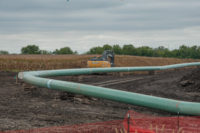The Biden administration is accepting through Sept. 29 public comment on a new proposal to streamline project environmental reviews under the National Environmental Policy Act. White House officials said the proposed rule, if enacted, would speed permitting for federal infrastructure projects while still upholding the intent and protections under the bedrock U.S. environmental law.
Environmental reviews on major infrastructure projects can take from five to seven years, and in extreme cases, can be held up for more than a decade. The Biden administration has acknowledged—along with lawmakers from both parties and construction industry groups—the need to improve the review process for projects critical for meeting U.S. climate and clean energy goals. But proposals vary as to what those improvements should look like and what types of projects they would cover. Bills that have been introduced by House Republicans differ sharply from those envisioned by Senate Democrats such as Environment and Public Works Committee Chairman Tom Carper (Del.)
The the White House Council on Environmental Quality proposal, published in the July 31 Federal Register, includes provisions to ensure that projects’ environmental impacts on traditionally disadvantaged communities are considered and that affected communities are able to engage early in the planning and review process.
John Podesta, President Joe Biden's senior advisor for clean energy innovation and implementation, said the proposed rule would “help accelerate infrastructure and clean energy deployment while promoting meaningful public input and advancing environmental justice.”
What’s in the Proposal?
Many of the proposed changes were called for in the debt-reduction bill passed by Congress in June and enacted into law. These include clarifying roles of lead and cooperating federal agencies in a NEPA review, setting deadlines and page limits for it and adding other requirements to ensure it is timely and consistent, according to administration officials.
“The time and page limits are useful, but it remains to be seen whether in practice agencies adhere to those or whether they are going to keep requesting extensions,” says Prianka Sharma, American Road and Transportation Builders Association vice president and counsel for regulatory affairs.
The council proposal also would allow “categorical exclusions”—broad categories of actions or activities designated by one agency to be exempt from environmental review that can then be exempted by others to avoid duplication of effort.
It also rolls back some provisions included by the Trump administration in its attempt to streamline environmental reviews that the Biden White House says only created more risk of litigation and jeopardized community input. One such provision encouraged agencies to require project opponents to post monetary bonds to seek a preliminary injunction against a project.
The proposal also would require that projects’ contributions to cumulative impacts of pollution or other environmental impacts on the communities most affected are considered, and that lead agencies provide steps for them to get involved early in the planning process.
The American Council for Renewable Energy (ACORE) is hopeful the rule, if enacted, could help clean energy projects move forward more expeditiously, says Allison Nyholm, vice president of government affairs. “We’re hoping that this [would help stakeholders] find out whether a project can move forward. Sometimes the answer is yes, and sometimes the answer is no, but you need to be able to get to that decision point.”
ARTBA’s Sharma notes that there are questions the transportation builders group will likely include in comments. It is currently unclear, for instance, whether environmental reviews necessary under NEPA could duplicate work required under other statutes, such as the Endangered Species Act or the Archeological Resources Protection Act of 1979, she says.
Additionally, ARTBA supports delegating authority for review oversight to state agencies, whenever possible, rather than having federal agencies simply coordinating with them, Sharma says. State agencies in general “have a little more bandwidth to know what’s going on in a particular state and know what issues and resources need to be protected,” she said.
New York and New Jersey both have already enacted legislation that incorporates social justice protections similar to ones in the federal NEPA proposal, such as on cumulative impacts. Regulations implementing the New Jersey law took effect in June.
Ray Cantor, vice president of government affairs at the New Jersey Business & Industry Association, claims the New Jersey rule will have a stifling effect on new manufacturing projects as well as retrofits of existing facilities because of the way it is written. The state's rule also stipulates that perceived—rather than actual—impacts be considered "stressors" that must be weighed and evaluated during the permitting process, he says. As a result, “It [will be] almost impossible to build any new major manufacturing facility in New Jersey,” he says.
The CEQ proposed rule is the second phase of the Biden administration’s effort to revamp the NEPA review process. The first, released in October 2021, restored requirements removed by the Trump administration that mandate climate change impacts to be considered during environmental reviews.





Post a comment to this article
Report Abusive Comment